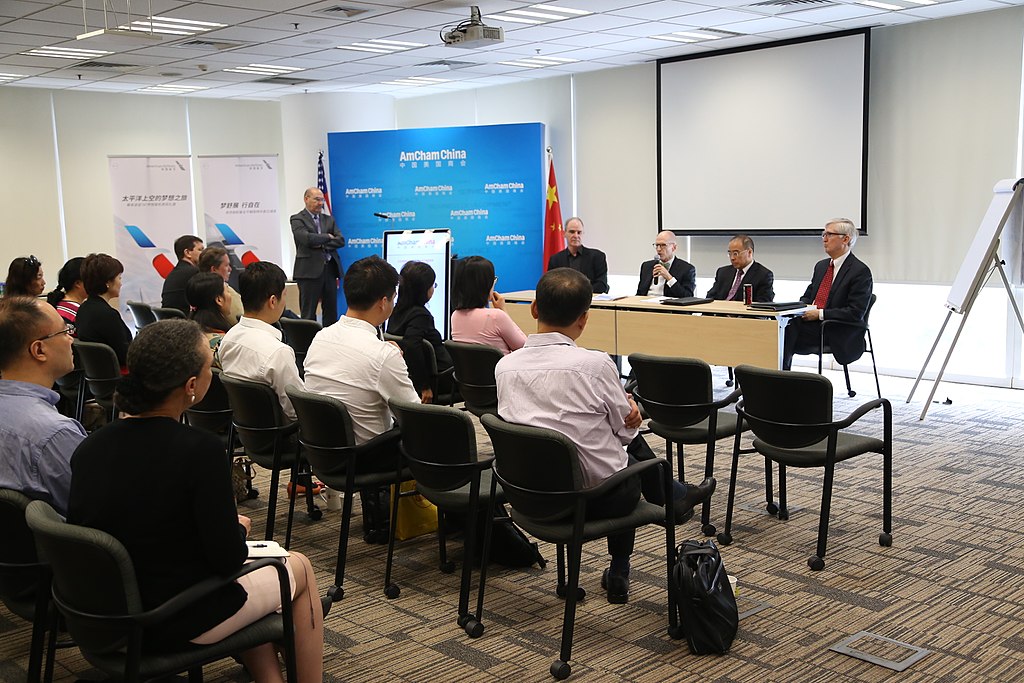US | Customs
January 28, 2025
China's 2025 Business Climate Survey Highlights Shifting Sentiments Among US Companies in China
As US and Chinese companies prepare for the potential impact of President Trump’s protectionist trade policies, uncertainty remains pervasive

AmCham China Board Members and President | by Hprinz
For over two decades, the American Chamber of Commerce in China (AmCham China) has conducted the annual China Business Climate Survey (BCS), providing an essential lens into the performance, outlook, and sentiments of American companies operating in China.
The 2025 edition of the survey, based on responses from 368 member companies across more than 20 industries, examines a range of pressing topics, including financial performance, business outlook, and perspectives on US-China relations. Conducted between October 21 and November 15, 2024—before and after the US Presidential Election—the report offers a comprehensive view of the challenges and opportunities facing US businesses in China.
GROWING CHALLENGES IN THE BUSINESS ENVIRONMENT
The report reveals a mix of resilience and obstacles for US companies in China, with geopolitical uncertainties and regulatory challenges continuing to weigh heavily on the business environment. A record number of companies indicated plans to move operations out of China or were already in the process of doing so, reflecting the impact of rising tensions as former President Donald Trump returned to the White House for a second term.
According to the survey, 30% of respondents explored alternative supply chains or relocated manufacturing out of China in 2024—double the percentage reported in 2020.
THE IMPACT OF TRADE TENSIONS AND RISK MANAGEMENT
US-China trade tensions remain a driving factor for relocation, with 44% of surveyed companies citing the strained relationship as a key reason for moving operations. Additionally, many firms pointed to risk management strategies, particularly in the aftermath of the COVID-19 pandemic, as motivation for diversifying their supply chains.
Developing countries in Asia emerged as the primary destination for relocating companies, attracting 38% of those considering or executing moves. Developed economies such as the US, EU, Japan, and South Korea also saw increased interest. Notably, industries like technology and research and development were among the most likely to relocate, with 41% of firms in these sectors taking such steps.
Amid the ongoing tech war between the US and China, restrictions on advanced technology exports and the retaliatory curbs on critical mineral exports have further complicated the business environment. The number of US companies that no longer rank China as a high-priority investment destination has grown significantly, reaching 21% in 2024—more than double the figure from 2020.
SHIFTING SENTIMENTS AMID REGULATORY CHALLENGES
The regulatory landscape in China has also contributed to growing uncertainty. Recent government actions, including raids on consultancies and audits as well as ambiguous cross-border data regulations, have dampened foreign investor confidence. Nevertheless, a third of respondents reported that the quality of China’s investment environment had improved in the past year—a five-percentage-point increase from 2023.
A CRITICAL MOMENT FOR US-CHINA BUSINESS RELATIONS
As US and Chinese companies brace for the potential fallout from President Trump’s protectionist trade policies, uncertainty continues to loom. While the president has delayed implementing a proposed 60% blanket tariff on Chinese goods, he reiterated plans for a 10% levy starting February 1, 2025, unless Beijing addresses the export of fentanyl precursors.
The survey underscores the fragility of the US-China business relationship in an era of heightened geopolitical tensions. Although foreign direct investment in China has plummeted to record lows, Chinese officials have sought to improve conditions for international businesses. The coming years will be pivotal in determining whether these efforts can restore confidence among foreign investors and businesses.
SOURCES/ RECOMMENDED RED:
About Authors:
Egypt | VAT
Egyptian Tax Authority (ETA) Rolls Out a Transparent, Hassle-Free VAT System for Global Providers of Digital and Remote Services.
Italy | VAT
Italy Seeks Nearly €1 Billion in VAT payments from Meta, X, and LinkedIn, Targeting Transactions from 2015 to 2022
Egypt | Tax Policy
Fostering Trust, Partnership, and Business Confidence Through Fair and Efficient Tax Services
EU | Customs
The European Commission extends tariff suspension on U.S. imports until April 14, 2025, aiming to resolve trade tensions and avoid escalation
OECD BEPS | Turkey
Amount B will not be applied to transactions involving distributors, sales agents, and brokers operating in Turkey
Saudi Arabia | Big 4
The ban could lead Saudi authorities to implement stricter compliance regulations for consulting firms
EU | Transfer Pricing
MNEs will be required to submit their first top-up tax information return by 30 June 2026, tax authorities will need to exchange this information by 31 December 2026
EU | Tax Policy
Focus on Green Transition, Addressing the VAT gap, and Commitment to Global Tax Reform are some of the priorities
Reach your target audience
Contact us at hello@taxspoc.com